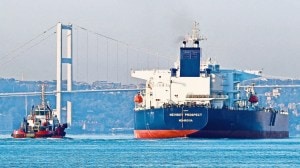The unipolar fantasy
An African proverb says that the proper way to conduct foreign affairs is to speak softly and carry a big stick'. The United States is o...

An African proverb says that the proper way to conduct foreign affairs is to speak softly and carry a big stick’. The United States is one country that is not only not accustomed to speaking softly but takes pride in carrying the big stick with impunity. Turn to its record from World War II days and you will know what we mean. Dropping two lethal atomic bombs on Hiroshima and Nagasaki, killing 105,000 persons. The massacre of 1,00,000 North and South Vietnamese civilians from 1955 to 1975 as part of the titanic struggle against communism. The support extended to innumerable feudal and military dictatorships in West Asia and elsewhere. The embargo imposed on Cuba, the coup against the popularly-elected Marxist government of Allende in Chile; the invasion of the Caribbean nation of Grenada on October 21, 1983; the seizure of Panama in December 1989 and the conspiracy against the leftist Sandinista regime in Nicaragua.
And, finally, the continuing attacks on Iraq by a president whose own private and publicconduct is not above reproach. The UN sanctions after the Gulf War, a decision virtually thrust on the international body by the US that has not even paid its dues for years, has already taken a heavy toll. Some 5,67,000 Iraqis have died due to disease, malnutrition and poor medical care. This is what is called a bizarre clash of civilisations’.
I hold no brief for President Saddam Hussain, the archetype of an authoritarian leader. Nobody can defend his unwarranted invasion of Kuwait, his persecution of the Kurds and his ruthless suppression of political dissent. But, then, how is the flawed iron man of Baghdad different from those Arab allies of the US who head conservative and undemocratic regimes? How does Baghdad pose a greater military danger than Tel Aviv? Is it not true that Israel, the chief US ally in the region, has not ratified the nuclear non-proliferation treaty and the 1972 biological and toxic weapons commission? Is it also not true that Israel has over 200 nuclear warheads?
Yes, it is.So, where are the Richard Butlers of the world to monitor the arms build up in that country? They use the big stick to beat the Iraqis or the Palestinians — the Other in the Western hemisphere — but turn a blind eye to Israel’s flagrant defiance of UN resolutions. There is justice for everyone in this world except them.
The message is loud and clear. Emboldened by the collapse of socialism, some industrialised nations of the Western world, notably the US and the UK, have chosen to impose their diktat on the rest of the world. Their leaders, President Clinton and Prime Minister Tony Blair included, speak the language of 19th century colonialists, and their attitude towards smaller nations is often hostile and belligerent. Living in the shadow of colonialism, their favourite preoccupation has been to break-up larger nations, such as the Soviet Union and Yugoslavia, and redraw geographical boundaries to promote their global economic and political interests. In the process, innocent citizens — Palestinians,Bosnian Muslims, Afghans, Chechyans and Kosovo Muslims — have become pawns on the chessboard of Western diplomacy.
Likewise, countries like Iraq continue to face reprisals because they dare assert their independence. This is a daunting prospect. Unless public opinion is created worldwide to thwart this neo-colonial project, Third World’ countries may find it increasingly difficult to maintain their economic and political autonomy. We need determined individuals and committed groups to rally around beleaguered nations like Iraq, find ways of dispersing the pall of fear which at present dims the hopes of Third World’ societies, and take effective steps to ensure that the self-styled champions of democracy do not spread their creed by force of arms.
This is not the time to sit back and wait for our cities to be targeted by American-British Cruise missiles. The assault on Iraq, coming as it does in the wake of many such belligerent acts in the past, must send tremors across the world and alert the weakernations to the impending danger to their independence. Whether this would lead to any concerned moves to thwart American excesses is unclear, though the role of Russia, China, France and Italy in recent weeks has been comforting. What would perhaps be of great interest in the weeks and months to come is the public mood in Cairo, Damascus and Amman and its possible impact on the Arab governments, many of which have succumbed to US pressures and made peace with the Western powers. Already, public discontent is growing about the stalled peace talks over the future of Palestine. The relentless US-British attacks on Iraq, which has alienated the people from their government in the Arab world, may prove to be the last straw.
In the long run, the Arab governments would be expected by their people and the liberal Left forces in the world to change their lazy habits and act as a catalyst to revive the secular and democratic underpinnings of Arab nationalism, pioneered by men like Jamal Abdul Naseer. They must learna lesson or two from the heroic struggle of the Palestinians who have, in the image of the exemplary martyrs of Kerbala (in Iraq), offered strong resistance to Zionism and colonial manoeuvrings. They must draw strength from the patience with which the Iraqi people, inheritors of the great Mesopotamian civilisation, have withstood the Anglo-American assault for so many years. This is, to say the least, their only hope of survival in a world dominated by the Other. If they fail to rise to the occasion and not respond to popular aspirations, they would erode whatever little credibility they enjoy at this juncture. The other imminent danger is that they would become more and more vulnerable to American pressures and intimidation.
Iraq’s destruction or Saddam Hussain’s removal would serve neither the immediate nor the long-term interests of the Arab rulers. Paradoxically enough, their political survival depends, in the present context, on how best the Iraqi president, a symbol of the Arab people’s resolve toresist US aggression, is able to handle the present crisis. If his assassination or removal is masterminded by the CIA, a possibility that looms large on the horizon, many heads may roll in Arab capitals, many grand palaces may be laid to siege by angry mobs. The Al-Hamas and other like-minded bodies, the main proponents of an anti-colonial and anti-Zionist ideology, are waiting in the wings to seize such an opportunity. Meanwhile, let us wait and see whether the fantasy of a unipolar world ruled by a single superpower remains a reality or an illusion.





- 01
- 02
- 03
- 04
- 05


























